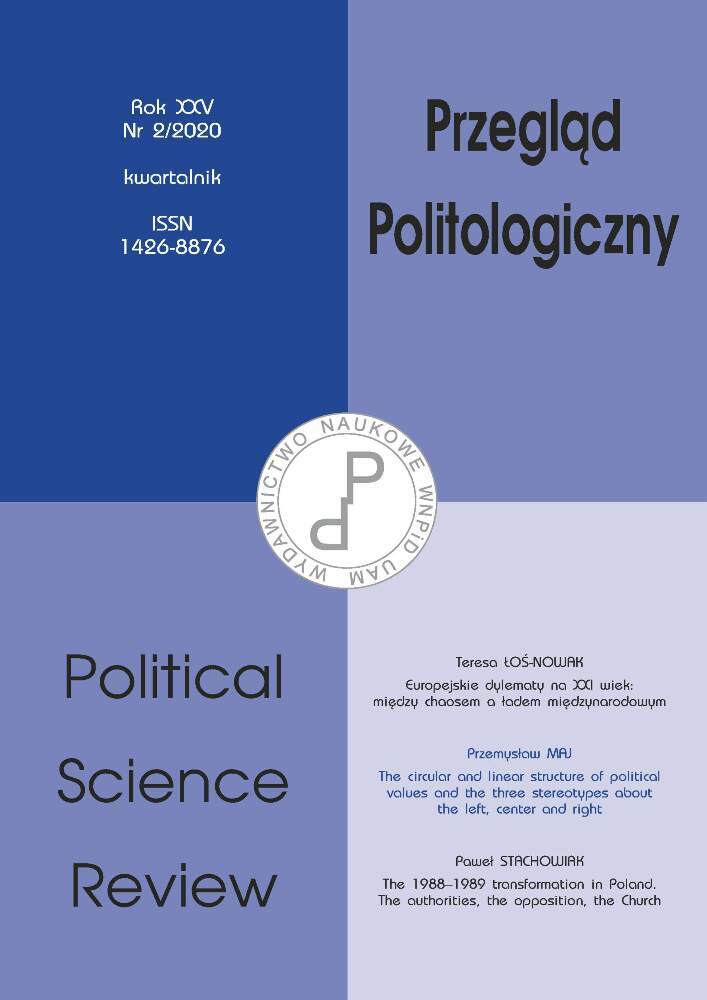Abstract
Poland’s accession to the European Union determines future membership in the Economic and Monetary Union (EMU). The subject of the research is the analysis of Polish policy towards EMU membership during the first 15 years of Poland’s membership in the EU. The research is political nature and intentionally does not focus on the economic benefits and challenges associated with Poland’s membership in the EMU.
The aim of research is to focus on changes taking place in the policy towards Poland’s membership in the EMU conducted by the ruling parties, successively by the coalition of the Civic Platform (PO) and the Polish People’s Party (PSL) – PO-PSL in years 2007–2015 and then by the Law and Justice (PiS) in years 2005–2007 in consultation with the Self-Defence (Samoobrona RP) and the League of Polish Families (LPR) as well as 2015–2019 in the coalition with the Jarosław Gowin’s Agreement (Porozumienie Jarosława Gowina) and Zbigniew Ziobro’s Solidary Poland (Solidarna Polska).
The main research questions relate to how has Poland’s membership in the EMU been perceived by the ruling parties since 2004 and what are the reasons for the fact that joining the eurozone by Poland until recently had been the strategic goal of the ruling elite of the country, and nowadays the strategic goal has become non-entry into the EMU.
The main research methods were the analysis of the content of documents and a comparative method. The first method allowed presenting the perspective of Poland’s entry into the euro area from the side of the ruling parties policy. That is why the text was mainly based on source materials, i.e. reports, government documents, political speeches, party election programs and press articles. The second research method allowed to compare the concept of Poland’s membership in the EMU presented in various programs of the ruling political parties.
The result of the conducted research indicates the radicalisation of the views of the Polish political scene. It also proves that date of adoption of the single European currency depends not only on meeting the convergence criteria, but also on which political option will rule in Poland.
References
Attack on zloty (2009), “Wprost 24”, no. 7, https://www.wprost.pl.
Bodalska B., Poland for the time being without hope for joining the eurozone, https://www.euractiv.pl, 05.01.2018.
Bratkowski A., Rostowski J. (2001), Why does unilateral euroization make sense in the case of Poland and (some) other candidate countries?, “Bank i Kredyt”, no. 11–12.
Chądzyński M., Godusławski B. (2018), What an economist thinks, that is the change of views of Tusk, Rostowski, Szczurek, “Biznes. Gazeta Prawna” of 12.05.2018, https://www.biznesgazetaprawna.pl.
Concerns and hopes related to the introduction of the euro in Poland (2013), CBOS Communique on the Research, Warsaw, March, https://www.cbos.pl.
Convergence Program. Update 2019, Republic of Poland, https://www.ec.europa.eu, 27.07.2019.
Determinants of the implementation of subsequent stages of the Road Map of the adoption by Poland the euro, the Ministry of Finance, The Government’s Representative for introduction of the Euro by the Republic of Poland, Warsaw, April 2009, https://www.mf-arch2.mf.gov.pl.
Donald Tusk’s Exposé from November 23, 2007, https://www.bankier.pl.
Frączyk J., Polish debt is growing faster than GDP, https://www.money.pl, 19.09.2019.
Glapiński A., Polish zloty is a strong Polish economy, inaugural speech during the NBP conference entitled „Zloty, euro and the Polish cause” organized on May 22, 2019 in Warsaw, https://www.nbp.pl.
Grochal R., Wroński P., President again from PiS, “Gazeta Wyborcza” of 28.02.2009, https://www.gazetawyborcza.pl, 23.07.2019.
IV Republic. Justice for All, Law and Justice, Program 2005, https://www.old.pis.org.pl, 24.07.2019.
Kaczyński L: first the referendum on euro, then the change to the constitution, Polish Press Agency of 31.10.2008, https://www.pb.pl, 23.07.2019.
Kołodziejczyk K. (2012), Poland’s Cooperation with International Financial Institutions, in: Poland’s Participation in International Organizations, eds. I. Rysińska, S. Parzymies, Wydawnictwo Scholar, Warsaw.
Maciejewicz P., Kołodko: may tie zloty against euro, “Gazeta Wyborcza” of 17.07.2002, https://www.wyborcza.pl, 19.07.2019.
Michalczyk W. (2013), Determinants of zloty to euro exchange rate in view of joining the ERM 2 mechanism, https://www.knfpan.pan.pl/images/Finanse_6_4-W.Michalczyk2.pdf, no. 1.
Priorities of Polish foreign policy 2012–2016 (2012), Ministry of Foreign Affairs Warsaw, https://www.msz.gov.pl.
Road Map of the adoption by Poland the euro, 28.10.2008, Ministry of Finance, https://www.mf-arch2.mf.gov.pl.
Stasiuk T. (2006), Gilowska on Poland’s readiness to adopt euro, “Puls Biznesu” of 30.11.2006, https://www.pb.pl, 24.07.2019.
The Law and Justice Program 2014, https://www.old.pis.org/dokumenty, 24.07.2015.
What Union do Poles Want (2017), Communication from CBOS research, Warsaw, April, https://www.cbos.pl.

